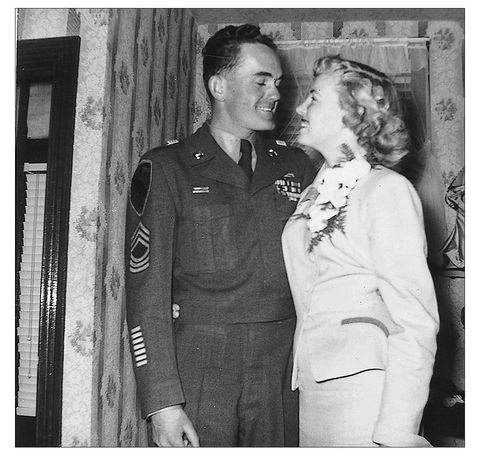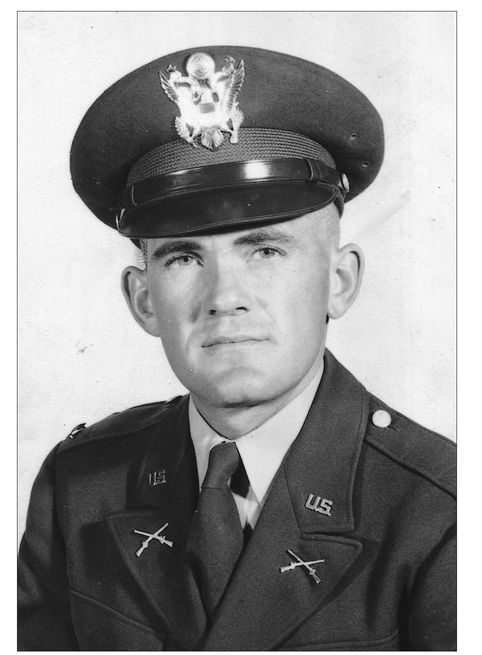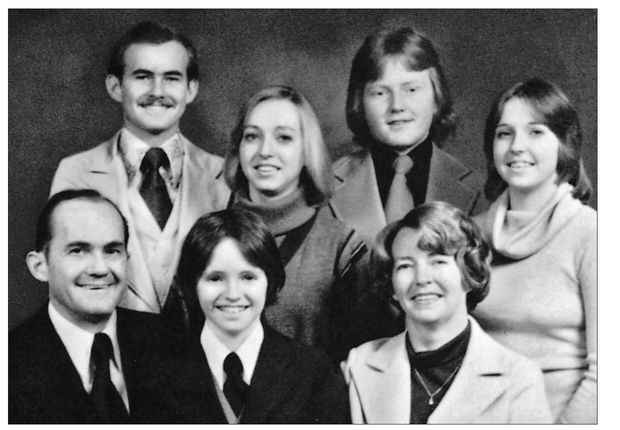Valleys of Death (30 page)
Authors: Bill Richardson

Finally, he stopped and looked at me.
“God, you look familiar. Where could we have known each other?”
I couldn't place him, so we went on talking about Murphy's situation. All of a sudden he asked me what unit I was with in Korea and then immediately asked if I knew Vaillancourt.
“Yeah, he was my platoon sergeant.”
He shot straight up and clapped his hands. I stood up and he gave me a hug.
“Did you ever give a couple of thirty-round carbine magazines to a lieutenant friend of his?”
Then it came back to me. Last time I saw this captain, he was a lieutenant and my section dug him out of a culvert in the Pusan perimeter. We stood hugging; a captain and a first sergeant. The other men didn't know what to think. He told me how one of the magazines I'd given him saved his life. He was in the culvert when he ran into a pair of North Korean soldiers. They fired just as he did. One of the North Korean bullets glanced off the magazine and hit his forehead, where he had been wounded during World War II. He spent almost a year in the hospital and then went to law school.
We talked a little about Vaillancourt and the battle at Unsan. I knew Vaillancourt was dead, but he was still listed as missing in action. That night I didn't sleep very well. Instead, I relived Pusan and Unsan. I thought about the captain, Vaillancourt and Murphy.
After all we'd been through, Murphy now had to defend himself against accusations made by unknown men. For all he or I knew the men who'd made the accusations had been the guilty ones. I hated this; it was not right. A man should be allowed to face his accusers. I knew one thing: Wherever my future took me, I would do my best to make sure men were treated justly. The way these proceedings were being handled made me feel very sad.
The next morning I was taken to the board of inquiry. It was held upstairs in a two-story wooden building near the barracks. When they called my name, I went up the stairs and entered the spartan room.
“First Sergeant Richardson reporting as ordered,” I said, snapping off a smart salute.
Inside the room were seven colonels sitting behind a long wooden table. Papers and pads covered up most of the fine wood. The presiding officer, his hair cut short and flecked with gray, returned my salute. Murphy and the captain sat nearby. I tried to catch Murphy's eye, but he avoided me. He looked tired and beaten.
I was sworn in by the presiding officer, a colonel.
“Take a seat, Sergeant,” he said.
The presiding officer started the questions. At first the questions dealt with me and how I knew Murphy. I remember the main question was hypothetical. If Murphy were taking a patrol into enemy territory, would I go with him?
“Murphy is a good soldier. He received the Silver Star before he was captured,” I said. “However, he was an engineer and I was an infantryman. If I was taking out the patrol, I would not hesitate a minute to take Murphy with me.”
The colonel smiled and made a note. There was a brief pause, then I asked a question.
“Have any of you ever been a prisoner of war?” I said, staring each officer in the eye.
A look of complete shock came over the members of the board. I don't remember what prompted me to ask the board members that question. Maybe it was out of frustration. These men knew nothing about what it took to survive three years in a prison camp. Starvation, lice and beatings. They hadn't watched their brothers die on a snowy road while sadistic guards tried to march the life out of them. They hadn't been left for dead in the morgue.
Everyone held his breath waiting for the colonel's reaction. He looked to the right and the three officers shook their heads no. He turned to the left and got the same reaction. Finally, the colonel looked at me.
“Sergeant Richardson, we got your message and thank you for your insight and appearance before the board,” the colonel said.
I stood up and saluted. He returned my salute and I could see all of the board members smiling. I did an about face and left the room.
As I walked out, I knew that nothing was ever going to intimidate me again. I'd already survived hell. I think from that day forward whenever I was faced with a tough situation I would think or in some cases say, What were they going to do, take me out in the morning and shoot me?
EPILOGUE
After Korea, I never looked back and asked why him and not me. I just accepted the idea that my life was a gift, and every day I tried to live that life the best way I knew how.
But my experiences in Korea were never far from my mind. I was never again faced with tougher decisions and I always knew that my mind was the key. It was the key to survival then and the key to overcoming every challenge afterward.
After a year as first sergeant of “G” company, 364th Infantry Regiment, I was reassigned to the regimental headquarters. The commander wanted to put me in for a direct commission, but a major in the headquarters encouraged me to go to Officers Candidate School instead.
“Bill, if you take a direct commission, you will probably be out of a job when they cut back the force,” he said. “Go to Officers Candidate School, get your commission and then you will at least have a couple of years to prove yourself.”
This was the best career advice I had received. So with my GED high school diploma in hand, I was off to Officers Candidate School and a career I could never have imagined. I graduated and was assigned to the 505th Airborne Infantry Regiment for five years, three of which were spent in Europe. Upon my return I was assigned to Special Forces at Fort Bragg, North Carolina.
That assignment took me all over the world and eventually into command of Project Delta in Vietnam. Created in 1964, the unit collected intelligence in remote areas. I started the unit from the ground up with the help of some very talented sergeants and officers. Project Delta still remains as the basic guide for operations deep in enemy territory.

Claire and I on our wedding day, February 20, 1954.
Author's collection
Author's collection

January 19, 1957. Starting my new career as 2nd Lieutenant.
Author's collection
Author's collection
After Vietnam, I returned to Fort Bragg and the 82nd Airborne Division. I had the privilege to command the First Battalion of the 325th Airborne Infantry for two years. An exciting time, shared with young enthusiastic bright men. The best our country had to offer.
A number of years later I was selected for regimental command. I opted to take command of the First Corps Support Command (COSCOM), a much larger command than a regiment and what I considered to be a greater challenge. During the fifty months I commanded COSCOM we conducted operations all around the world. Our motto was “The Sun Never Sets on COSCOM.” I was the last infantry officer to com-mand COSCOM. It would be an understatement to say that this command was a challenge.

U.S. Army War College, Carlisle, Pennsylvania, 1978. (back row): Bill III, Lynn, Mark, and Cathy. (front row): Bill Jr., Jeff, and Claire.
Author's collection
Author's collection
During my thirty-nine-year career, I have had the honor of working with some of the finest soldiers and officers in the Army. Looking back, my career may have started out as a means to escape the streets of Philadelphia, but it ended up being a great and rewarding experience. But it would never have been anything without Claire.

The other half of the photo that Wray was carrying in prison. Claire was carrying this half while I was in prison. This half has been on our refrigerator for the past fifty-seven years.
Author's collection
Author's collection
Soon after coming back from Korea, I married the love of my life, my soul mate, Claire. She gave me five wonderful children and a great family life. She supported me in every way, including helping to put me through college, something I could never have accomplished without her.
Every day on this journey I believed the men of the weapons platoon and my close buddies in prison were watching me to see how I looked after my men and prepared them for whatever they may have had to face.
I tried my best to make them proud of me.
INDEX
Page numbers in
italics
indicate photographs or maps.
italics
indicate photographs or maps.
Acheson, Dean
Afghanistan
airmen (U.S.) and propaganda
Aleutian Islands
Allen (replacement)
America.
See
United States of America
See
United States of America
ammunition shortage, Unsan
amphibious landing at Inchon
Anderson (Doctor)
Andersonville (Civil War)
animals, POWs as
Appleman, Roy E. (Lieutenant Colonel)
arrow wound infection incident
Australian bombers
baptism of fire
barracks, WWII
Bataan (Philippines)
battalion, forming the
beer
Black (soldier)
black compound, POWs
Bookbinders (restaurant, PA)
boredom, enemy
born again
bravery
breakout, Unsan
Brewster
(USNT)
(USNT)
Brien (First Sergeant)
British units
Bromser, Paul (Lieutenant)
company commander
death march
death of
Pyongyang
38th parallel, pursuit to
Tokyo for Thanksgiving rumor
Unsan
wounded, leaving behind
wounds of
brotherlike bond with crew
Brown, Jim “Old Firepower Brown” (Lieutenant)
Browning automatic rifles (BARs)
buildings, WWII
burial detail
Burma
burp guns (Chinese)
Camel's Head bridge
Camp 5 “The University of Pyoktong,”
Camp Stoneman (CA)
capitalistic vs. socialistic system
capture and escape
Other books
An Earl to Enchant by Amelia Grey
Narrow Dog to Carcassonne by Darlington, Terry
El tercer gemelo by Ken Follett
Captain Future 25 - Moon of the Unforgotten (January 1951) by Edmond Hamilton
City of Ash by Megan Chance
Invasion Rabaul by Bruce Gamble
The Sunday Arrangement by Smith, Lucy
Time After Time by Tamara Ireland Stone
An Honest Ghost by Rick Whitaker
Infandous by Elana K. Arnold